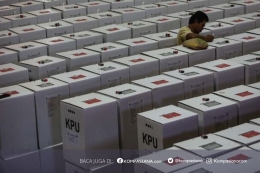The French Revolution is unique in that it introduced us a whole new world about politics & warfare as we know it. It shattered our previous understanding about the inter state politics. No longer did a monarch could rule based on Divine Rights of Kings where the doctrine states that the reason a King is ruling was because they had been chosen by "God". The Revolution gave rise to a new entity called Nationalism. And this is quite important. Most countries these days based their rule on Nationalism.
The idea behind this is a government could only be deemed legitimate as long as it has the support of the population (the nation) (Cederman, 2011). With the birth of nationalism, comes also the birth of a new monster called "Public opinion". The reason why I called it a monster is because in my view, this entity is truly powerful. Public opinion, simply put, is irrational.
Much of the post-French Revolution politics are based on public opinion. Clausewitz knew this fact about human nature very well when he wrote his book, Vom Kriege. No government, regardless of how authoritarian they are, could survive going against this entity. The psychological force behind this entity is such a strong force that any government risking going against this force, most of the time, are often being overthrown. A lot of state policy these days has to conform to the so-called "National Psychology". This is why a state often create things like national anthem, rituals, and myth narratives (Anderson, 2006).
All of these is done as to make an imagination that a state is composed of a unified homogenous nation. Clausewitz in his book theorized that in modern era, no government could stand without the support of this new national psychology and no state could win a war without willpower. On that note, a state should unleash the mass loyalty & primordial violence that is inherent deep within the people if it wish to be the victor of a war. He argued that this spirit is much more important than any military maneuver.
"War is a political instrument to force the enemy to submit to one's will" he argued (Clausewitz, 1989). Clausewitz explained that there are two kinds of war: Limited war and Absolute war. Limited War is a type of war where the political goal is quite clear and the "rational" government placed a check on the mass violence of the "irrational" people. Hence the name "Limited". Absolute War, or some call it Total War, is a type of war where the mass violence of the people went into its most extreme and the war will not ended until the very destruction of the enemy state (or people).
These psychological forces (primal violence, intense nationalism, etc) we can clearly see the effect during the great cataclysmic years of 20th century. Both world wars are what I personally call "Nationalist war". That is, these wars weren't really fought for natural resources per se, like the later wars like 2003 Iraq War. No, those two wars were war between peoples.
For the First World War, one of the main reasons for the war was the intense Franco-German rivalry. France lost the 1871 war to the Germans and because of that had to ceded the region of Alsace-Lorraine, a region with significant ethnic French, to German Empire.
This one act intensely humiliated the French people. So intense the hatred, that the French people are willing to have another war in order to take it back. We always have this perception that war is (understandably) bad and no one wanted a war. But when all the countries were declaring war to each others in 1914, a lot of the populations in each states were in jubilee upon hearing the news, even if it were only temporary. The Second World War is also a great example of how potent is the role of national psychology in warfare.
The invasion of Soviet Union by Nazi Germany brought about one of the cruelest war and atrocities human history has ever seen. The Germans viewed the Slavic people as "inferior", only fit to be exterminated. The official numbers for the casualty the Soviet Union suffered according to the Russian government is around a staggering 26.6 million to 27 million. About which, 15 million to 17 million were civilians murdered in Soviet territory by the Nazis. The Soviet population went from around 200 million on July 1941 dropped down to 170 million on 1945. But even with such a significant loss, why didn't the Soviet Union collapsed as the Germans hoped ?
Because the Germans failed to break the Soviets' will. As Clausewitz stated before, a state could only win as long as it maintain its willpower. For the Soviets, this war is a war of extermination.
The Germans waged a war whose purpose is not just to gain resources or something, but for extermination. A war where if the Soviets lose, it's not just territory and natural resources that are at stake, but the literal existence of the Slavic people. If there's one thing the Germans didn't understand is that their intent of destroying the Slavs fanaticized the Slavs to their extreme to fight the Germans. This is shown by the willingness of the Soviet Union to sacrificed 15 percent of its population in order to win the war against the Germans. No matter how good the German military was in the Eastern front, no matter how gargantuan the numbers of Russian troops that were killed by the Germans, the Russians just stubbornly refused to submit to the Germans' will. The will force of the Russians is simply greater than that of the Germans'.







